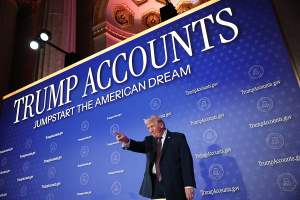Christian economics should be about helping the poor, not hurting the rich

If Democrats run out of complaints about the U.S., they can always fall back on inequality, which they think has become the silver bullet that will kill the monster in their nightmares, capitalism. Have freer markets lifted 500 million out of starvation poverty in China and India in the past generation? It doesn’t matter because inequality increased. Are black Americans the richest people on the planet? Democrats couldn’t care less. Inequality is worse than in Europe, the measure of all things good and beautiful.
Pew Research found that 78% of Democrats but only 41% of Republicans think the U.S. inequality rate is too high. That’s understandable since inequality is highest in states controlled by the Democrat party.
Bernie Sanders described inequality in the U.S. this way: “The outrageous inequality and corporate greed we are facing today is grotesque, it is immoral, and it is unsustainable."
The Washington Post informed us, “The U.N. warns that runaway inequality is destabilizing the world’s democracies. The report is unusually clear-eyed in acknowledging that the distribution of wealth and power is a zero-sum game.” Meanwhile, Rep. Alexandria Ocasio-Cortez agreed that “’a system that allows billionaires to exist’ is immoral… It is ‘wrong’ that billionaires can coexist in a country alongside ‘parts of Alabama where people are still getting ringworm because they don’t have access to public health.’”
Last year, House Speaker Nancy Pelosi created the Select Committee on Economic Disparity and Fairness in Growth focused on addressing wealth inequality. AOC will be charge of “generational disparities and increasing worker power.”
The Financial Times reported that Ray Dalio, the billionaire founder of Bridgewater Capital,
“…has called on US politicians to declare the growing wealth gap a national emergency and take urgent steps to address it or face the prospect of a violent revolution where ‘we are all going to try to kill each other….The world has gone mad and the system is broken.”
But hold on! There is a problem with the logic of measures of inequality: they calculate dollars of income, not what one can buy with it. So, if an inventor of a new product makes a lot of money from it, his income goes up. But the income of the people who use it doesn’t. They use it because its price has fallen. Think the internet. Consumers have become wealthier by having more goods than before, but their incomes haven’t risen, so the statistics show that they are no better off.
William Nordhaus, a Sterling Professor of Economics at Yale University and a recipient of the 2018 Nobel Prize, has shown that innovators can receive as little as 2% of the total profits from a new invention. That means consumers absorb the other 98% in the form of lower prices. Their incomes haven’t risen, but they can buy more stuff with the same amount of money, thus making them richer.
Electronics have demonstrated this for over 50 years. The prices of electronic goods, such as cameras, computers, televisions, etc., have fallen rapidly for the past half century. In 1990, a poor personal computer by today’s standards would have cost $4,300 adjusted for inflation. Today, a computer ten times more powerful can be bought now for under $1,000, making people richer. After all, wealth consists in the goods and services we enjoy, not the paper money that is merely an aid to commerce and a unit of account to help us compare the costs of different things.
Here is another example. Prices in general can rise only if the stock of money increases. If the money stock remains fixed, as it might under a pure gold standard in which no new gold mines were discovered, prices would gently fall with the increase in productivity. Assuming the population didn’t increase, incomes would never change. For example, if the US had $1 trillion in gold, GDP would always be $1 trillion. But as prices fell, everyone would become richer because they could buy more cell phones, steaks, coffee, Fords, etc., with the same incomes. But since incomes didn’t change, the statistics would show no improvement in living standards. That means the standard measures grossly exaggerate inequality.
In addition to being inaccurate, most measures of inequality can’t distinguish between good and bad inequality. Inequality is bad if it’s caused by theft and fraud, as happens in many poor countries, or by taxes. But in the West, age is a major cause of inequality because older people earn more due to their greater experience and investments. Young people start out earning minimum wages with no savings.
Also, immigrants and the explosion of households headed by single mothers increases inequality at the lower end of the spectrum. If single mothers would live with family, as they did in the past, they would no longer be poor according to the statistics. And it’s good that immigrants enjoy an opportunity to improve their lots in life.
With all the problems involved in measuring inequality, why are Democrats so devoted to it? The answer is they are consumed by envy and have elevated it to a virtue. But Jesus called envy a destructive evil. He said in Matthew 6:23,
“But if your eye is evil, your whole body will be full of darkness. If therefore the light that is in you is darkness, how great is the darkness.”
The “evil eye” is well known in most of the world as an expression of envy and is used again in Matthew 20:15 and Mark 7:22. The Greek word phthonos is translated as envy in many other passages. Envy is the worst of the seven deadly sins because it aims at the destruction of the person envied and does not benefit the envying person. On the other hand, one of the marks of a loving person is one who can be as happy for the successes of another as if they were his own.
Christians should again see envy as repulsive. Then we would worry less about inequality.
Roger D. McKinney lives in Broken Arrow, OK with his wife, Jeanie. He has three children and six grandchildren. He earned an M.A. in economics from the University of Oklahoma and B.A.s from the University of Tulsa and Baptist Bible College. He has written two books, Financial Bull Riding and God is a Capitalist: Markets from Moses to Marx, and articles for the Affluent Christian Investor, the Foundation for Economic Education, The Mises Institute, the American Institute for Economic Research and Townhall Finance. Previous articles can be found at facebook.com/thechristiancapitalist. He is a conservative Baptist and promoter of the Austrian school of economics.



























